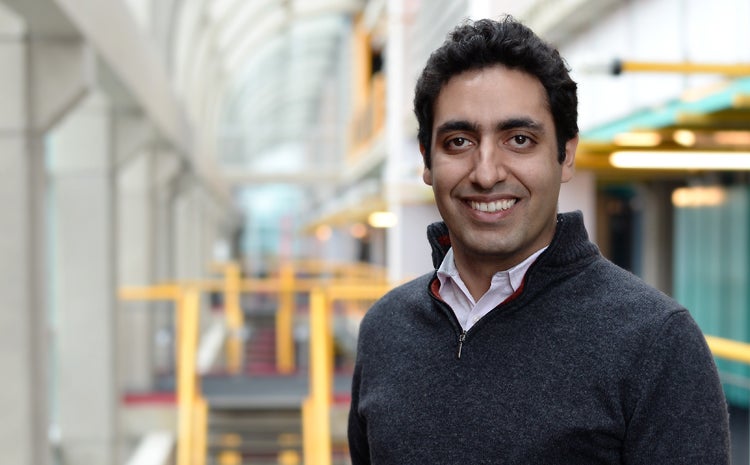Omid Abari joins the David R. Cheriton School of Computer Science as an Assistant Professor in the systems and networking research group. He specializes in developing wireless networks and mobile systems for the Internet of Things — interconnected devices that collect, share and analyze data.
From health watches and intelligent appliances to sensors that monitor traffic and gauge energy use, IoT devices are extremely diverse and number well into the billions. Despite their widespread adoption and projected growth, several technical barriers limit their potential.
IoT devices send their data to the cloud using Wi-Fi and cellular networks that are already stretched thin. Furthermore, many wireless devices are tiny or are in difficult-to-access areas, so their usefulness and lifespan depend on how efficiently they consume energy.

Professor Omid Abari joined the David R. Cheriton School of Computer Science in January 2018
“Traditionally, we’ve designed IoT devices in layers — a physical layer comprised of a battery, circuit and antenna, on top of which is a network layer that runs the network protocols, on top of which is an application layer that delivers the final service to the user,” Abari explains. “This method simply can’t keep up with demands. Devices need to be low powered so they can run on a battery for a long time, and they must use bandwidth efficiently because we simply don’t have sufficient spectrum available.”
Abari solves these problems by designing and implementing entire software–hardware systems. “Instead treating each layer of a connected device separately I design them as an intelligent integrated system that is orders of magnitude more efficient in energy and wireless spectrum use. To do this we need intelligent batteries, intelligent antennae, intelligent everything — basically, putting computation through the whole stack,” he says.
Abari has tackled bandwidth limitations by developing new millimeter-wave devices and protocols that overcome signal blockage and alignment issues. His innovative solution will allow new IoT applications to be developed, such as untethered high-definition virtual reality systems.
“Today’s high-end VR systems require a cable to stream high-definition video from a computer or game console to the headset, but the cable limits the user’s movements and presents a tripping hazard,” Abari explains. “To overcome these problem, I designed and implemented a wireless millimeter-wave system that tracks the user’s movements and maintains the data rates needed for high-definition VR systems.”
Abari has tackled the energy consumption issue by developing low-power, resource-constrained sensors. In one such system called Caraoke, the software–hardware system he developed uses solar-powered sensors mounted on street lamps to communicate with transponders so drivers can find parking spots more easily in congested cities.
“Finding a parking spot is difficult in the Boston area where I did my PhD. Caraoke provided an innovative solution that also significantly reduced traffic, lowered CO2 emissions and cut energy use,” he said. “Caraoke was deployed on the streets and won the Boston is the Smartest City competition.”
Abari is excited to join the Cheriton School of Computer Science because of the breadth and depth of its researchers, adding that it’s a perfect environment because of the many opportunities to collaborate with researchers who work on theory, networking, security, artificial intelligence, among many other research areas.
“I’ve begun collaborating with Professor Keshav on designing a new system for intelligent lighting. Right now, lighting isn’t efficient so we’re looking into ways of adjusting lighting in a room based on people’s location. We will build on each other’s expertise to create more efficient and intelligent lighting systems.”
Abari completed his PhD in Electrical Engineering and Computer Science at MIT. He received a Bachelor’s degree with high distinction in Communications Engineering from Carleton University, where he was awarded the Senate Medal for Outstanding Academic Achievement. His research has been featured in Wired, Engadget, TechCrunch, and New Scientist. He was awarded the Merrill Lynch Fellowship in 2011 and Natural Sciences and Engineering Research Council of Canada Postgraduate Scholarships in 2011 and 2013. He won the ACM Student Research Competition in 2014 and 2016.